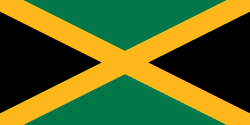 | |
| Country | |
|---|---|
| Code | JAM |
| Created | 1936 |
| Recognized | 1936 |
| Continental Association | PASO |
| Headquarters | Kingston, Jamaica |
| President | Christopher Samuda |
| Secretary General | Ryan Foster |
| Website | www.joa.org.jm |
The Jamaica Olympic Association (IOC code: JAM) is the National Olympic Committee representing Jamaica. It is also the body responsible for Jamaica's representation at the Olympic Games.

